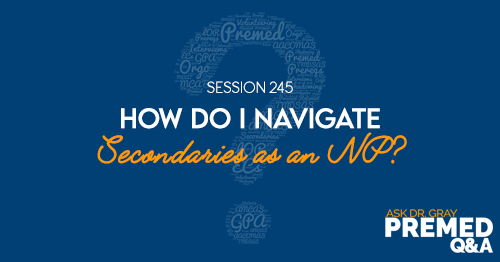Apple Podcasts | Google Podcasts

Session 147
Our student today is concerned about his downward trend. But what does a downward trend really look like? Listen in to find out how to reverse a downward trend to prove to medical schools that you’re academically capable.
Ask Dr. Gray: Premed Q&A is brought to you by Blueprint MCAT. Listen to this podcast episode with the player above, or keep reading for the highlights and takeaway points.
The episodes in this podcast are recordings of our Facebook Live that we do at 3 pm Eastern on most weekdays. Check out our Facebook page and like the page to be notified. Also, listen to our other podcasts on MedEd Media. If you have any questions, call me at 617-410-6747.
[00:24] Question of the Day
“I am a fairly nontraditional applicant and I feel my stats are competitive for a lot of MD schools. However, I think more important than the specific number for my GPA, which is okay but not great, is the trend. And I have a downward trend, which is lethal in some schools.
And so I feel as if I have a good explanation for the downward trend and be able to tell my story and explain that. But one thing I’m worried about is potentially coming off as if I’m making excuses rather than explaining the downward trend.”
[01:05] What is a Downward Trend?
A lot of students who have a 3.9 GPA and then dropped to a 3.7 think they have a downward trend. And this is not a problem.
So this student has a 3.40 GPA and 3.35 science GPA. He’s concerned that it’s exacerbated by the fact that he spent his first two years at a community college. But I wouldn’t worry about that part. Specifically, he’s worried medical schools would raise some questions that he did well at community college, and not so well at university.
His GPA trend is at 3.8, 3.6, 3.7, and senior year is 3.0. So his senior year is going to sting him a bit.
He explains that he didn’t decide on medicine until about a year after having graduated college. He didn’t know what he was doing in college so there wasn’t a lot of focus or motivation.
[02:42] Too Much on the Plate
He started out vaguely wanting to major in chemistry and biochemistry, just because that’s what he did well in high school. He ended up double majoring in physics and biochem. And a lot of his poor grades are from quarters where he was simultaneously taking mechanics, electromagnetism, modern physics lab, and Genome Sciences. He was also doing undergraduate research, and working about 30 hours a week to support himself.
“It's a super common story of students taking on too much and then falling behind in courses.”Click To TweetIt sounds like he wasn’t premed at this time. He didn’t want to be a doctor until after that. And so, he most likely needs to take a postbac to reverse that trend. He will be able to reverse what that graph looks in terms of starting off well coming down, and then with postbac work coming back up. Otherwise, he won’t be able to have a chance to explain it unless he reverses the trend. Hence, the need for postbac work.
[05:41] The Need for Postbac Work
Our student says he has gone back and forth a couple of times and applied two years ago without any interview invites. When he asked for feedback, medical schools gave him different viewpoints. One school told him he has shown academic competency so it wasn’t the problem. Another school told him he needed additional coursework. Regardless, my advice is still to get that additional postbac coursework.
'The last thing a school wants to be concerned about is your level of commitment to doing well in medical school.'Click To TweetThere is that concern of doing well at a community college where you did well and you got to what many perceive as harder courses at a four-year university and you struggled. Then medical school is just going to add another level of complexity onto that. And so, they’re worried you’re going to struggle more.
Nobody wants to cross the finish line stumbling and falling down, which is what you’ve done in terms of just your GPA.
You can do well on standardized tests, but there’s still a lot more work that goes into medical school than just doing well on standardized tests. So that’s the concern across the board.
[09:38] Lack of Clinical Experience
This student used to work at a restaurant that had a huge emphasis on community service, offering free meals to the homeless and low-income neighborhoods. Then he also volunteered in child life. He feels it gave him a new perspective and the opportunity to develop some meaningful relationships, not only with children but also with their families.
His current job is a team coordinator at a cancer hospital, working closely with physicians, meeting with them every week, and going over the care plans for each patient. He also gets to interact with the patients and develop long-term relationships. He was also able to witness the patient-doctor interaction. And all this just affirmed his decision to want to go to medical school.
Now, my fear with the child life position is they may think it’s just play time. This other position as well as a coordinator sounds a little bit more of admin-based stuff and not necessarily clinical-based.
'Getting those experiences is not to check off a box for the medical schools, but it's to be able to reflect upon the right experiences so your personal statement makes sense.'Click To TweetConnecting the restaurant industry to wanting to be a doctor can be questionable too as there’s no direct line between the two. And this is why he’s going to be having a harder time talking about why he wants to get into medical school given the lack of true clinical experience.
[19:29] Submitting LORs and Secondaries
Our student is actually applying for this next cycle and he says he has about six letters of recommendation at this point. Three of them are from the previous cycle, and two of them have been re-dated for the current year at the recommendation of several schools. One of the state schools specifically requires letters dated for the current year.
If you’ve already been requested to write the secondary, if you’re just sitting on it and waiting for the letter of recommendation, the school might think you’re not interested. Because it took you a month and a half to fill out the secondary.
But in his case, since he has been verified and submitted to one school, he could just wait at this point and give it another week or two.
Links:
Medical School HQ Facebook page
Medical School HQ YouTube channel
Instagram @MedicalSchoolHQ
Join the Application Academy!
The Premed Playbook: Guide to the Medical School Personal Statement
The Premed Playbook: Guide to the Medical School Application Process
SEARCH SITE
LISTEN FOR FREE











